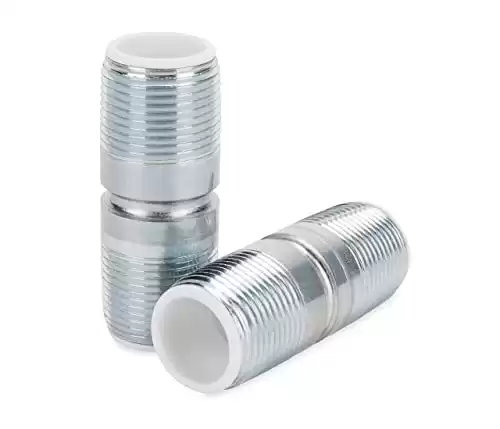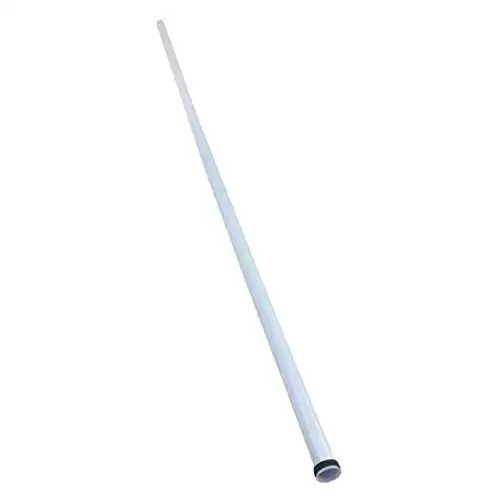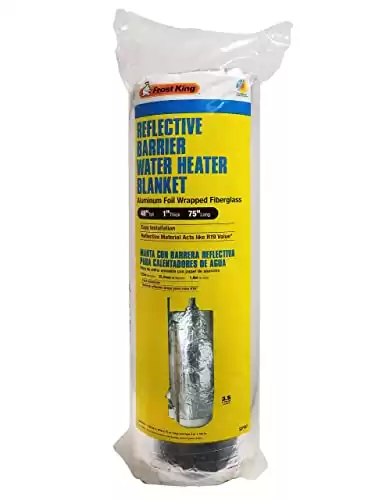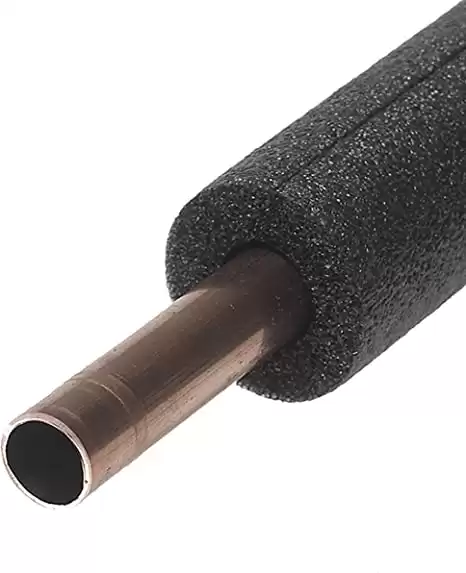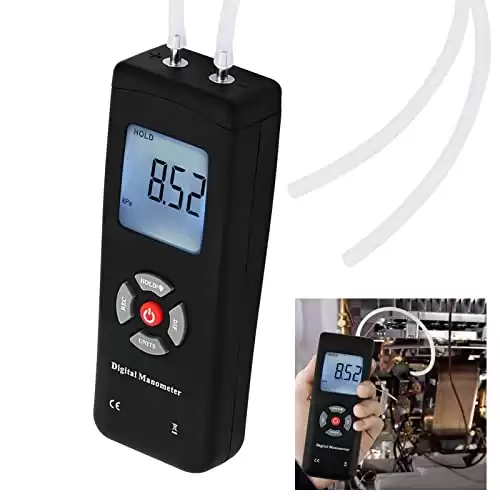What’s that sound coming from the water heater?! Your water heater is one of the most important appliances in our homes that often goes unnoticed. It typically does its job quietly until it starts to make weird and scary noises, then you know something isn’t right!
No need to act like Macaulay Culkin and flee your basement when your water heater makes a rumbling noise and comes to life!
This guide will show you how to silence your water heater once and for all. It will walk you through the possible causes of your noisy water heater, as well as give you some tips on how to fix them yourself without calling in a professional. You’ve got this – and we got you!
Is A Water Heater Supposed To Make Noise?
A little bit of noise is normal. Gas water heaters typically make more noise than electric hot water tanks. But both types of tanks will generate some sound as they heat up and cool down.
Should I Be Able To Hear My Hot Water Heater?
Yes and no. You may be able to hear your water heater as it operates but noise from your water heater does not always indicate an emergency situation like an impending leak or flood.
Most of the time you will be able to hear your water heater working while it warms up the water inside the tank.
Gas burners will fire up and electric heating elements will hum when there is a demand for hot water. If your water heater is equipped with an exhaust motor or circulation pump, expect to hear a few extra decibels of noise while the water heater is working.
Is A Noisy Water Heater Dangerous?
Most sounds are not a sign that there is trouble brewing inside your water heater. But some sounds left unchecked could decrease the efficiency of your water heater or damage its components if not corrected.
Water Heater Sounds And Solutions
It’s time to turn your ears to your water heater to see what each noise is telling you. Listen up!
Popping, Bubbling, Or Knocking Sounds
By far this is the most common sound coming from your water heater. The rumbling you hear is an indication that you have an excessive build-up of mineral deposits in the bottom of your tank.
Sediment buildup is especially problematic for those with hard water. Having hard water doesn’t mean your water is “harder” than normal water. Rather hard water has a higher mineral content than typical tap water.
Unsure if you have hard water? Check out our tutorial on how to test your water at home!
Get your hard water test results in seconds!
The reliable and consistent accuracy of these test strips provides a simple and convenient way to measure water hardness.
The calcium, magnesium carbonates, bicarbonates, and sulfates settle out of solution as your hot water tank heats up the water. And this sediment and limescale build-up in the bottom of your water heater.
In fact, the noise you are hearing is the sound of hot water bubbling and percolating up through the sediment on the bottom of your tank near the burner.
The sound of sediment in your water heater isn’t necessarily scary but the reduced efficiency of your appliance may make your utility bills frighteningly expensive, yikes!
If you ignore this noise from your hot water tank long enough the
The Solution
Luckily, there’s an easy solution to this problem. The best way to prevent sediment from building up is to have the water heater flushed out so all of the mineral deposits are removed.
It’s important to flush and fill your water heater at least once a year. This prevents sediment build-up, which can lead to decreased performance of the appliance that may force you into costly repairs or replacements in the future.
You can learn how to flush a water heater like a pro with our step-by-step guide HERE.
How Often Should You Flush Your Water Heater?
It’s important that you flush your water heater every year to make sure it is running at its best efficiency. If the mineral content of your local water supply is extremely high, then flushing may be necessary every six months or even more frequently if needed!
How Much Does It Cost To Flush A Water Heater?
The average cost of a water heater flush ranges anywhere from $80 to $200, so it pays to learn how to do it yourself!
How Do I Fix My Hard Water Problem?
Not only is hard water, well, hard on your appliances and plumbing but the scaling found in your pipe is a breeding ground for harmful bacteria.
This scale increases the risk of pathogenic bacteria like Legionella which can cause Legionnaire’s Disease, yikes!
So if you are one of the nearly 85% of American homes with hard water, the obvious solution is to install a water softener. Water softeners remove calcium and magnesium ions from your water supply.
What’s that? You want the technical sciencey explanation? We got you!
Your typical water softener will have a tank with several cubic feet of porous plastic resin. This resin media is covered with molecules that will attract and bind to the positive ions in your water.
The positively charged ions like calcium and magnesium in hard water stick to the resin and are then replaced with sodium ions to restore the electrical balance of your tap water.
Every few days, the water softener will “regenerate” itself and renew the resin by rinsing the resin with a concentrated salt water solution. This will coat the resin with sodium ions so the resin is ready to soften your water again, yay science!
Screeching Or Whistling Sounds
A screeching or whistling noise is typically an indication that the flow to your water heater is restricted. The squeal from your water heater is most noticeable when hot water is being used somewhere in your home and your tank is refilling with cold water.
The Solution
Start with the simple solution; check your water heater’s inlet valve and make sure it’s completely open. This should stop your screeching sound!
If not, you probably have a blockage at your water heater’s inlet. You might even notice a reduction in your hot water pressure throughout your home. The dielectric connection to your water heater could be the culprit because they can get corroded over time and cause a restriction in water flow.
Protect your water heater from corrosion!
Dialectric nipples with thermoplastic lining help prevent galvanic corrosion and the ends are tapered pipe thread for a fluid-tight seal. Sold in a convenient 2-pack.
The water heater’s dip tube may also be clogged. This tube delivers cold water to the bottom of your water heater so it doesn’t mix with the warmest water at the top of the tank.
Both your inlet connection and dip tube will require you to shut the water OFF to your heater and drain it to inspect these components.
Keep your water heater running right!
Easy to install, just trim the length to fit your water heater.
Sizzling Sounds
Save the sizzling sounds for your bacon! A sizzling sound coming from your water heater is a sign of moisture on the burner. The accumulation of moisture on your water heater’s boiler is caused by either the formation of condensation or a leak inside your water heater.
Just like your favorite frosty beverage on a hot patio creates droplets of condensation on your glass. When the warm air from the combustion inside your water heater hits the cold surface of the inside of the tank, it reaches its dew point and leaves water droplets on the inside of your water heater. Who’s ready for a drink??
These water droplets then rain down on your hot burner and create a crackling sizzle sound. Condensation on your burner is quite common if you are turning on your water heater for the first time, after a maintenance flush, or if it has been shut off for a while.
A tank full of cold water is more likely to create condensation than a water heater that has completed a heating cycle. The temperature change from cold to hot is most likely the culprit for the sizzling sounds.
Another, but less common, cause for a sizzling sound from your water heater is a leak inside the hot water tank. This is a sign that the vessel of the water heater has ruptured and needs replacing.
The Solution
You’ll want to take a peek inside your water heater’s combustion area for further inspection. If you open the small cover at the bottom of the water heater you can see your burner if it has an open combustion chamber. For hot water tanks with sealed combustion chambers, you can look through the sight glass window towards the burner assembly.
If you notice a few droplets of water on your combustion chamber that doesn’t last very long, it’s probably just condensation. Nothing to worry about!
But if it looks like it’s raining inside your water heater, there’s water on your floor, or your water heater has stopped working, the water is probably coming from a leak. A leaking water heater needs to be replaced to stop the sizzling sound before the water damage gets worse!
Sneezing Sounds
No, your water heater is not coming down with the case of the sniffles. The occasional blustering sneezing sound combined with water on your floor near the water heater is an indication that your water heater’s Temperature and Pressure
Your hot water tank’s T&P valve is a 2-in-1 safety device that protects your water heater from unsafe conditions. A T&P valve is designed to prevent the water inside the tank from boiling or becoming over-pressurized.
When the T&P valve senses either of these conditions it’s triggered to release water to reduce the internal temperature or pressure. Sounds scary but during normal operation, your T&P valve stays closed and won’t make a sound!
The Solution
Your T&P valve is exposed to high temperatures and mineral deposits which can cause the safety
If your T&P valve is functioning properly the sneezing sound could be a sign of other plumbing problems in your home.
First, check to see that your water heater’s temperature isn’t set too high. We recommend a temperature setting of 120° F. Any higher than this and you increase the potential of scalding yourself with hot water.
Because your water heater’s safety valve is also triggered by a build-up of pressure, your incoming water pressure may be too high. You can grab a water pressure
Your water pressure shouldn’t exceed 80 pounds per square inch (psi). Excessive water pressure can put a lot of strain on your plumbing, create water hammer issues, and cause premature wear on your fixtures and appliances. If you have extremely high water pressure a Pressure Reducing Valve (PRV) should be installed in your home.
Under Pressure?
Queen and David Bowie aren’t the only ones that are feeling the pressure. If you sense your plumbing is experiencing too much pressure, contact your local water or utility company. You may be relieved to know that some municipalities may test your water pressure and install a PRV for free!
The last thing that might cause your water heater to sneeze is over-pressurization from a “closed-loop” system. If you have a check valve or backflow preventer installed on your water lines you may have a water heating system with nowhere for expanding pressure to go.
As water is heated, it expands in volume! If this additional volume doesn’t find a home your T&P valve will relieve the pressure, and the water, on your floor.
You will need to do a little plumbing diagnostics. Did you recently have any waterline work done recently in your home? Did you have a new appliance like a water softener with an internal check valve installed? Or you might need to check to see if your water heater is equipped with an expansion tank and that it’s functioning properly.
That should remedy your sneezing water heater!
Pounding Sounds
If you hear knocking or pounding sounds coming from your pipes, it’s a sign of water hammer. Water hammer is the result of an increased pressure spike from a quick change in your water’s direction of flow.
This is most commonly caused by fast closing plumbing fixtures or appliances with solenoids valves like dishwashing and clothes washing machines.
The pounding from the water hammer can reverberate through your plumbing system and be heard at your water heater.
The Solution
The best way to put a nail in your water hammer sounds is easy! If your home is older and is equipped with air chambers, you’ll need to drain your waterlines to recharge the flooded air chambers.
Alternatively, you can look at installing hammer arrestors to cushion the hydraulic shock at problematic locations where you notice the most pounding sounds.
You can learn all about how to fix water hammer and protect your pipes with our tutorial HERE.
Woofing Sounds
Who let the dogs out? Sorry, I couldn’t help myself. But if you are hearing woofing sounds from your water heater, it’s coming from something less cute than a puppy and more dangerous than an attack dog.
The huff or woof coming from your water heater is caused by flame rollout. Just as the name implies, flame rollout occurs when combustion gases from your water heater’s burner are ignited and rollout of the normal combustion area.
Flame rollout can be hazardous to your water heater components that are not fire-resistant like electrical wiring or the gas valve. Hot water tanks that suffer from severe flame rollout will have scorch marks outside the combustion chamber and pose the risk of burning bystanders.
The smell of burnt leg hair and questioning why you were wearing shorts to fix your water heater are less important concerns because flame rollout could also forecast a buildup of the “silent killer” gas – carbon monoxide.
The Solution
The most common cause of flame rollout is a restriction in the venting for your water heater. The gradual accumulation of soot in your water heater’s flue or heat exchanger can create the perfect atmosphere for flame rollout.
Inspecting and cleaning your water heater’s flue or heat exchanger is all it takes to remedy this dangerous combustion condition.
What Causes Soot?
Soot is a normal byproduct of combustion. But problematic soot can be a sign of improper combustion. You can spot poor combustion at your water heater’s burner if you notice a yellow “lazy flame”. If you see yellow flames instead of blue it’s time to clean your water heater burner or have your gas pressure checked.
Venting obstruction from foreign objects is another leading source for flame rollout. Check your flue or venting for leaves, twigs, or even a bothersome bird’s nest!
The final, but less common, cause of woofing from flame rollout is a gas leak. Even a small crack in the pilot tube is enough to let excess gas accumulate and “bark” when ignited.
If you smell gas or suspect a gas leak, turn OFF your water heater and call a professional for help!
Hissing Sounds
You are not hearing a rouge reptile inside your water heater! A hissing sound coming from your water heater is a sign that your water heater’s burner is dirty and due for a cleaning.
A dirty water heater burner that is covered in soot and debris is going to operate less efficiently and consume more fuel than normal.
The Solution
We recommend that you clean your water heater’s burner at least once a year. This will ensure that your hot water tank is running its best, saving you money on utilities, and extending the life of your water heater.
You can get all the dirty details on how to clean a water heater burner HERE.
Ticking Sounds
If you are noticing a ticking sound coming from your water heater, it’s likely that a change in temperature is creating some expansion and contraction of your hot water tank.
As the water in your heater warms up and cools down, it expands and contracts. This can cause fluctuations in pressure or even small pings which you might hear as ticking sounds coming from inside of the water heater.
You can tell the ticking is from expansion and contraction because the tempo of the ticking will typically increase as the water is heated and slow in cadence as it cools.
Pipes that are not supported properly can also make ticking sounds when they rub against walls or wooden framing as they warm up and cool down.
The Solution
Some sounds of expansion and contraction are completely normal. The internal flue inside your hot water tank will make some noise as the water heater goes through heating cycles.
But you can help quiet down the water heater vessel from creaking with an expansion tank. Installing an expansion tank will give the increased volume of heated water someplace to go instead of putting strain on your hot water tank.
Made in the United States!
Made of durable stainless steel and is lead-free.
A pressure reducing valve (PRV) would also protect your water heater from increasingly high inlet water pressure.
But a more cost-effective solution is to add some insulation! An insulated jack for your hot water tank will not only deaden sounds coming from your water heater but will also reduce heat loss, double win!
Help the environment by saving more energy!
Save money on your utility bills by reducing heat loss up to 40%. Easy to install and easy to clean.
The same principle applies to your ticking pipes and waterlines. Properly securing and insulating your plumbing is an easy way to improve energy efficiency and keep things quiet. Pipe-down pipes!
Helps prevent your pipes from freezing, sweating, and heat loss.
Whirring Sounds
Whirring sounds are normal with water heaters that are equipped with a blower motor. These blower motors are basically fans that force exhaust gases outside your home.
This greatly increases the efficiency of your water but it does come with added noise.
You should notice a gentle hum from the blower motor when it is working. But if you start hearing odd or excessive noise, it’s time to fix that fan!
The Solution
Is your blower motor turning ON and OFF frequently? If so, you may have a problem with your blower motor or pressure switch. The cycling ON and OFF indicates that your blower motor can’t muster the proper bluster.
It may be time to take the blower motor apart and give it a thorough cleaning. The fan blades, housing, and venting should be free of dirt and debris so it can blow its best.
If you are hearing a grinding or squealing while the blower motor is operating that means the bearings inside the motor are wearing out and will require some repairs or replacing.
Pressure switches for blower motors can also cause water heater issues. You can test the wind power of your blower motor and check for a faulty pressure switch by using a manometer. A manometer will measure the pressure created by your blower motor to see if the fan is pushing enough air to “prove” your pressure switch.
The professional choice when measuring pressure.
The large backlit LCD display makes it easily measure differential pressure with its dual input probes.
Clicks, Crickets, Or Chirping Sounds
Sounds to us like your water heater is having an ignition problem. All that clicking and clunking can be problematic to diagnose depending on the style of water heater you have.
Some water heaters will attempt to relight repeatedly and others will only try several times before locking out in an error code. Typically all this clicking culminates in you not having any hot water, ugh!
The Solution
The clicking sounds from your water heater could signal an issue with your ignitor, flame sensor, or gas valve.
If your water heater is not lighting but has gas going to the burner, a faulty ignitor is probably to blame. When your water heater burner only ignites momentarily, the flame sensor is your main suspect.
No spark or gas? Then your problem is most likely with the water heater’s gas valve. You can delve deeper into troubleshooting your specific water heater by reading the owner’s manual or checking and referencing any error codes displayed on the gas valve.
Smelling Gas?
If you smell gas or suspect a gas leak, turn OFF your water heater immediately and call a professional for help!
Simply need help relighting your water heater? Then follow our easy step-by-step guide HERE.
Did You Hear That?
Silence those scary noises coming from your hot water tank. With a little hard work, you can keep the racket in your mechanical room to a minimum! Your water heater will be quiet as a winter night the next time you’re Home Alone.
Happy Plumbing!
Recommended Reading
How To Measure Pipe Size The Easy Way
Find out how to measure plumbing pipe size easily and accurately with our free tool. This handy ruler will save you money and frustration!
How To Flush A Water Heater
Flushing your water heater and discovering the schedule that keeps your hot water tank happy and healthy is easy. We will show you how!
How To Replace A Water Heater Drain Valve
Replacing a water heater drain valve is an easy way to upgrade your hot water tank and protect your property from water damage. We will show you how!
How To Repair A Garden Hose
Nothing ruins your outdoor fun faster than a leaking garden hose. Save money and your hose by fixing it yourself in five minutes flat!
How To Relight Your Water Heater’s Pilot Light
Nothing ruins a hot shower faster than a snuffed out water heater pilot light, Brrrr! We will show you how to safely get your water heater fired up again!
The Ultimate Guide To Plumber’s Putty
Plumbers get all the fun with their own version of Play-Doh! Plumber's putty is waterproof and easy to use, we will show you how!

